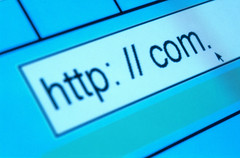 The Internet is set to undergo one of the biggest changes in its four-decade history, with the expected approval this week of international domain names — or addresses — that can be written in languages other than English, an official said yesterday. That change could potentially open up the Web to more people around the world as addresses could be in characters as diverse as Arabic, Korean, Japanese, Greek, Hindi and Cyrillic, in which Russian is written. The Internet Corporation for Assigned Names and Numbers, or Icann — the non-profit group that oversees domain names, or website addresses — is holding a meeting this week in Seoul.
The Internet is set to undergo one of the biggest changes in its four-decade history, with the expected approval this week of international domain names — or addresses — that can be written in languages other than English, an official said yesterday. That change could potentially open up the Web to more people around the world as addresses could be in characters as diverse as Arabic, Korean, Japanese, Greek, Hindi and Cyrillic, in which Russian is written. The Internet Corporation for Assigned Names and Numbers, or Icann — the non-profit group that oversees domain names, or website addresses — is holding a meeting this week in Seoul.
One of the key issues to be taken up by Icann”s board at this week”s gathering is whether to allow, for the first time, entire Internet addresses to be in scripts that are not based on Latin letters. “This is the biggest change technically to the Internet since it was invented 40 years ago,” Mr Peter Thrush, chairman of the Icann board, told reporters, calling it a “fantastically complicated technical feature”. He said he expects the board to grant approval on Friday, the conference”s final day.
The Internet”s roots are traced to experiments at a US university in 1969, but it was not until the early 1990s that its use began expanding beyond academia and research institutions to the public. Rod Beckstrom, Icann”s new president and chief executive, said Internet addresses would no longer use limited “Generic Top-Level Domains” such as .com or .org, and instead use more flexible “Internationalised Domain Names” such as .post or .bank. He said the change would also allow Internet users to type fewer keystrokes to access a website, saving “roughly 60 to 100 billion human keystrokes a day” by getting rid of the last four or six keystrokes that are needed to find Web addresses ending, for example, with .co.kr or .com.
If the change is approved, Beckstrom said, Icann would begin accepting applications for non-English domain names next month, adding that the first entries into the system would likely come sometime in the middle of next year. Enabling the change, Thrush said, is the creation of a translation system that allows multiple scripts to be converted to the right address. “We”re confident that it works because we”ve been testing it now for a couple of years,”” he said. “And so we”re really ready to start rolling it out.”
Of the 1.6 billion Internet users worldwide, Beckstrom — a former chief of US cybersecurity — said more than half use languages that have scripts based on alphabets other than the Latin one. “So this change is very much necessary for not only half the world”s Internet users today, but more than half of probably the future users as the use of the Internet continues to spread,” he said.
The Straits Times
